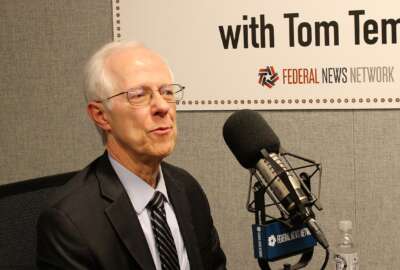

New numbers from the Bureau of Labor Statistics are adding to concern that inflation is going to be with us for some time. The impacts to individual pocketbooks are...
Best listening experience is on Chrome, Firefox or Safari. Subscribe to Federal Drive’s daily audio interviews on Apple Podcasts or PodcastOne.
New numbers from the Bureau of Labor Statistics are adding to concern that inflation is going to be with us for some time. The impacts to individual pocketbooks are pretty obvious. The impacts to federal agencies and their contractors, though, are a bit more complex. To talk more about how inflation has impacted the contracting marketplace and how the government has responded so far, Federal News Network’s Jared Serbu on the Federal Drive with Tom Temin spoke with Stephanie Kostro, the executive vice president for policy at the Professional Services Council.
Interview transcript:
Jared Serbu: Stephanie, thanks for joining us, as always, let’s talk about inflation. New numbers out and they are not good. What are the impacts to your members, specifically, that you’ve been seeing in recent months?
Stephanie Kostro: Thanks for asking, Jared. Thanks, obviously, for having me on yet again. So inflation is the top issue of concern among the services contractors that we’ve been talking to. And it is mostly because the government predicted into their pricing structure, they incorporated rates of about 2%. 2.2% for this fiscal year. And what we’re seeing if you go back to the Department of Labor’s Bureau of Labor Statistics, they released consumer price index numbers last Friday, the 10th, that put that number at 8.6. So what you’re looking at is, you know, you’re planning for 2%, you’re somewhere in the range of eight to 9%. And what does that mean for government contractors, the price of goods, obviously, is going up, the price of transportation of those goods, with all of the fuel incorporated into that going up, the price of labor is going up. And that’s where we’re running into some real issues. The workforce implications of higher than expected inflation are astounding, you’re looking at lots of 10s of 1000s of unfilled billets to begin with that those are positions that are funded but not filled with personnel. So we were already facing a tight marketplace, then you add in inflation, and your government contractor employee is looking at his or her paycheck going, I can’t buy what I could buy a year ago. And because I’m under government contract, I’m a little bit limited into what I can get paid going forward. So why don’t I look elsewhere? Why don’t I look into the purely commercial market, which has flexibilities built into it? The government contracts simply don’t.
Jared Serbu: Yeah. And in a full employment environment, which we are now in, those decisions to go somewhere else are a lot easier, I would imagine for individuals.
Stephanie Kostro: They are. And I think, when you’re looking at it, the government itself is is facing a workforce shortage, the government contracting spaces as well. And as I mentioned, when you’re tied to wage determinations, and there’s a set schedule, it’s really hard to bounce back from that. One area where the government has been helpful is GSA, the General Services Administration, asked back in March for industry feedback on inflation on supply chain disruptions. And they tied them to what’s called an economic price adjustment, an EPA. Usually company can ask for three or four of them per year. And that is to deal with unanticipated costs or price increases that, you know, are just really too difficult for the company to bear. The GSA took some industry advice and released an acquisition policy memo in mid-March of 2022 that put a moratorium on the number you can ask for. So basically, they said, “come and ask us for economic price adjustments”. We’ll devolve the level of decision making down, so it’s easier to ask, it’s easier to understand why you might have gotten denied or to get to yes, faster. So that was really a positive step. DOD came out with a similar set of guidance, or rather, addressing inflation in a memo just a couple weeks ago, that was a guidance memo to contracting officers to tell them how to treat economic price adjustments. Jared, one of the issues that we’re facing is because we’ve had historically low inflation for so many years, some of these contract clauses that would have been put into place in the ’80s or early ’90s that would allow for economic price adjustments simply weren’t in the contract. So you’ve got contractors who don’t have any recourse. And that DOD memo was to focus on how we can address this issue together. And we’re working with DOD to to explain that memo. And to take it a little bit further with our services contractors.
Jared Serbu: Yeah, that DOD memo was interesting in that it sort of encouraged economic price adjustments and explicitly rejected the idea of requests for equitable adjustment, which may have been a little bit easy, an easier way to approach this. It looks like this is going to have to be tackled contract by contract, contracting officer by contracting officer. How difficult is that going to be? And are you seeing evidence of this memo playing out on the ground yet?
Stephanie Kostro: It is very difficult. You hit the nail on the head contract by contract, including those that don’t have the clauses in them that you may have to add the clauses to to allow people to request this. We at PSC are working with White House folks, whether it’s Office of Federal Procurement Policy or elsewhere, to think about a blanket memo that would apply government-wide specific to the situation. There is precedent, they did submit a memo that took effect across the government when COVID first started, and we needed to get folks still working, but working remotely, so there is precedent for a government wide memo to be released. We are encouraging consideration of that for this situation as well. Because contract by contract, not only would it take forever, but it would cost a lot in terms of contracting officer hours, and distractions from other other issues that that need to be taken care of.
Jared Serbu: Let’s, before we let you go, Stephanie talked about a few pieces of legislation making their way through Capitol Hill before everybody disappears for election season. A good news story, I think, from PSC’s perspective is it looks like passage of the America COMPETES Act is possibly on the horizon. Briefly tell us what that would mean to your members. And in what the good news is there.
Stephanie Kostro: Sure you know, I always love talking about when the government, including the Hill, gets things right. The America COMPETES Act really is historic in terms of surging American production of much needed items like semiconductors, like chips, and looking at, you know, supply chain vulnerabilities and the need to bolster STEM, you know, research and science technology, leadership in the domain. So, from our government contractor perspective, this is really hopeful in terms of research development, really tackling some of the supply chain issues a little bit more holistically. You know, the Biden Harris administration has a couple of different irons in the fire in terms of executive orders and things that are coming out of them. Some of it is getting ahead of the power, dynamic in terms of China and technology. So investing in STEM. Another one is reducing supply chain vulnerabilities. So this is a great way for the Hill and the executive branch to work together to really tackle that for the betterment of service delivery to the American taxpayer.
Jared Serbu: And another one I’m sure you’re going to be watching is the stop price gouging the military bill dropped last week by Senator Elizabeth Warren and there’s counterpart legislation in the House by Congressman John Garamendi, from California. All kinds of stuff in there. Some adjustments to how the Truth in Negotiations Act (TINA) works, changes to the definition of commercial items. How’s this look to you? And what are some possible concerns around this piece of legislation?
Stephanie Kostro: As you mentioned, it was dropped recently, I think it was on Thursday of last week, June 9. And so we are reading it, because as you know, in much of this legislation, the devil is in fact in the details. When you look at the very title of this bill, the stop price gouging the military, I think everyone can get on board with that. But when it comes to defining what is a commercial item, in a space, like technology, I’ll go back to the previous topic where things are dual use, right? It’s used in commercial applications as well as military applications. The question becomes, what is a commercial item? How do you move forward? Who gets to determine what the correct price should be? And what that looks like going forward? So we are reading this legislation with a great, great amount of attention. It’s very important to our services contracting industry. I would also say, you know, we are faced with the National Defense Authorization Act markup. The House started last week. The Senate’s starting, I could very well see since both Senator Warren and Representative Garamendi sit on the armed services committees that this might be in play for that cycle as well.
Jared Serbu: Let me ask specifically about the adjustments to TINA, because that’s really where the IG has been focused in the aftermath of its investigations into excessive markups in the spare parts market. It seems on its face to be doing exactly what the IG asked, which is making it easier for contracting officers to get cost or pricing information, if there’s not adequate price competition. Are there ways that the bill could do that that would be concerning for you that would go beyond just trying to make sure that price gouging isn’t happening?
Stephanie Kostro: You know, when we talk about industry, we talk a lot about the secret sauce for particular goods and services. And so, when you talk about how an item is priced, you really go into some of what are the inputs, why is the company paying for that? There is some proprietary information. And so, what I would not want to see is a whole wholesale opening of the books in terms of what is specific to a company, what do they have intellectual property over, because I would not want information to be made public that could then be used against a company and that is really something that we’re watching out for.
Jared Serbu: Stephanie Kostro is executive vice president for policy at the Professional Services Council.
Copyright © 2025 Federal News Network. All rights reserved. This website is not intended for users located within the European Economic Area.
Jared Serbu is deputy editor of Federal News Network and reports on the Defense Department’s contracting, legislative, workforce and IT issues.
Follow @jserbuWFED



